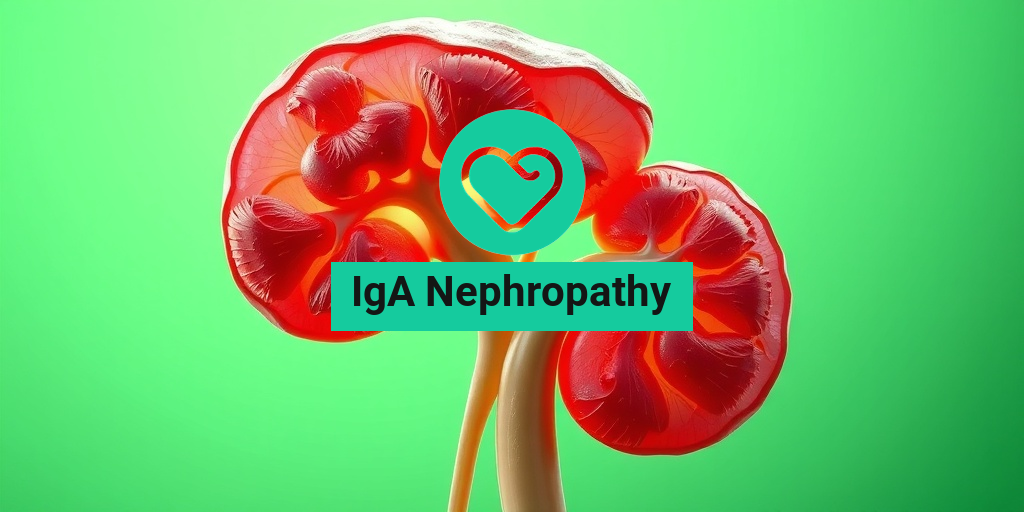What Is IgA Nephropathy?
IgA Nephropathy, also known as Berger’s disease, is a kidney disorder characterized by the buildup of immunoglobulin A (IgA) in the kidneys. This condition leads to inflammation and can ultimately affect kidney function. It is one of the most common forms of primary glomerulonephritis, which is a group of diseases that cause inflammation of the kidney’s filtering units, known as glomeruli.
Understanding the Pathology
The exact cause of IgA Nephropathy remains unclear, but it is believed to be linked to an abnormal immune response. When the body produces IgA antibodies in response to infections or other triggers, these antibodies can accumulate in the kidneys, leading to inflammation and damage. Over time, this can result in scarring and a decline in kidney function.
Who Is Affected?
IgA Nephropathy can affect individuals of all ages, but it is most commonly diagnosed in young adults and adolescents. It is more prevalent in males than females and varies significantly across different populations. Genetic factors, environmental triggers, and infections may all play a role in the development of this condition.
Stages of IgA Nephropathy
IgA Nephropathy can progress through various stages, which are often classified based on kidney function and the severity of symptoms. Understanding these stages is crucial for effective management and treatment:
- Stage 1: Mild kidney impairment with few or no symptoms.
- Stage 2: Moderate kidney impairment; patients may experience some symptoms.
- Stage 3: Severe kidney impairment; significant symptoms and complications may arise.
- Stage 4: End-stage kidney disease, requiring dialysis or transplantation.
IgA Nephropathy Symptoms
Recognizing the symptoms of IgA Nephropathy is essential for early diagnosis and treatment. While some individuals may remain asymptomatic for years, others may experience a range of symptoms that can vary in severity.
Common Symptoms
Some of the most common symptoms associated with IgA Nephropathy include:
- Blood in Urine: This is often the first noticeable symptom and can appear as pink or cola-colored urine.
- Protein in Urine: This may not be visible but can be detected through urine tests.
- Swelling: Patients may experience swelling in the hands, feet, or face due to fluid retention.
- High Blood Pressure: Hypertension is common and can further complicate kidney function.
- Fatigue: A general feeling of tiredness or weakness may occur as kidney function declines.
When to Seek Medical Attention
If you notice any of the above symptoms, especially blood in your urine, it is crucial to seek medical attention promptly. Early diagnosis and intervention can significantly improve the prognosis and quality of life for individuals with IgA Nephropathy.
Living with IgA Nephropathy
Managing IgA Nephropathy often involves lifestyle changes, regular monitoring, and sometimes medication. A diet low in salt and protein may be recommended to help reduce kidney strain. Additionally, maintaining a healthy weight and controlling blood pressure are vital for slowing disease progression.
For those seeking more information on managing IgA Nephropathy, resources like Yesil Health AI (yesilhealth.com) can provide evidence-based answers and support tailored to your needs.
In conclusion, understanding IgA Nephropathy is essential for effective management and treatment. By recognizing the symptoms and seeking timely medical advice, individuals can take proactive steps toward maintaining their kidney health. 🌟

Causes of IgA Nephropathy
IgA Nephropathy, also known as Berger’s disease, is a kidney disorder characterized by the buildup of Immunoglobulin A (IgA) in the kidneys. This accumulation can lead to inflammation and damage, ultimately affecting kidney function. Understanding the causes of IgA Nephropathy is crucial for effective management and treatment. Here are some of the primary factors that contribute to this condition:
Immune System Response
The primary cause of IgA Nephropathy is an abnormal immune response. In individuals with this condition, the immune system produces an excess of IgA antibodies, which are typically responsible for fighting infections. When these antibodies accumulate in the kidneys, they can trigger an inflammatory response, leading to damage over time.
Genetic Factors
Research suggests that genetics may play a significant role in the development of IgA Nephropathy. If you have a family history of kidney disease, particularly IgA Nephropathy, your risk of developing the condition may be higher. Genetic predisposition can influence how your immune system functions and how it responds to infections.
Environmental Triggers
Environmental factors may also contribute to the onset of IgA Nephropathy. Some studies indicate that respiratory or gastrointestinal infections can trigger the immune response that leads to the disease. For instance, a common cold or a gastrointestinal infection may provoke an increase in IgA production, setting off the chain reaction that results in kidney inflammation.
Other Health Conditions
Certain health conditions can increase the risk of developing IgA Nephropathy. These include:
- Chronic liver disease: Liver dysfunction can affect the immune system, potentially leading to increased IgA levels.
- HIV/AIDS: These conditions can compromise the immune system, making it more susceptible to kidney damage.
- Coeliac disease: This autoimmune disorder can also be linked to increased IgA production and subsequent kidney issues.
Risk Factors for IgA Nephropathy
Identifying the risk factors associated with IgA Nephropathy can help in early detection and management of the disease. While the exact cause remains unclear, several factors have been identified that may increase the likelihood of developing this condition:
Age and Gender
IgA Nephropathy can affect individuals of any age, but it is most commonly diagnosed in young adults, particularly those between the ages of 15 and 35. Additionally, men are more likely to develop this condition than women, with a ratio of approximately 2:1.
Family History
A family history of IgA Nephropathy or other kidney diseases can significantly increase your risk. If a close relative has been diagnosed with this condition, it’s essential to discuss your risk factors with a healthcare provider.
Ethnicity
Research indicates that certain ethnic groups may be more prone to IgA Nephropathy. For example, individuals of Asian descent, particularly those from East Asia, have a higher prevalence of the disease compared to other ethnic groups. This suggests that genetic factors may play a role in susceptibility.
Environmental Exposures
Exposure to certain environmental factors, such as pollutants or toxins, may also increase the risk of developing IgA Nephropathy. While more research is needed in this area, it’s essential to be aware of your surroundings and potential exposures that could impact your kidney health.
Infections
As mentioned earlier, infections can trigger the immune response that leads to IgA Nephropathy. Individuals with a history of recurrent infections, particularly respiratory or gastrointestinal infections, may be at a higher risk. Maintaining good hygiene and seeking prompt treatment for infections can help mitigate this risk.
In summary, while the exact causes of IgA Nephropathy remain complex and multifactorial, understanding the underlying factors can empower individuals to take proactive steps in managing their kidney health. If you have concerns about your risk for IgA Nephropathy, consider consulting with a healthcare professional for personalized advice and guidance. 🩺

Diagnosis of IgA Nephropathy
Diagnosing IgA Nephropathy, also known as Berger’s disease, can be a complex process that involves several steps. This kidney disorder is characterized by the deposition of immunoglobulin A (IgA) in the glomeruli, which can lead to inflammation and damage. Early diagnosis is crucial for effective management and treatment. Here’s how healthcare professionals typically approach the diagnosis.
Initial Symptoms and Medical History
The first step in diagnosing IgA Nephropathy often involves a thorough review of the patient’s medical history and symptoms. Common symptoms may include:
- Blood in urine (hematuria) – This can appear as pink or cola-colored urine.
- Protein in urine (proteinuria) – This may be detected during routine urine tests.
- Swelling (edema) – Particularly in the legs, ankles, and around the eyes.
- High blood pressure – Often a sign of kidney issues.
Patients may also be asked about any family history of kidney disease, as genetic factors can play a role in the development of IgA Nephropathy.
Laboratory Tests
Once initial symptoms are noted, healthcare providers will typically order a series of laboratory tests to confirm the diagnosis:
- Urinalysis – This test checks for the presence of blood and protein in the urine.
- Blood tests – These tests assess kidney function by measuring creatinine and blood urea nitrogen (BUN) levels.
- 24-hour urine collection – This helps quantify proteinuria, providing a clearer picture of kidney function.
Kidney Biopsy
If the initial tests suggest IgA Nephropathy, a kidney biopsy may be necessary. During this procedure, a small sample of kidney tissue is removed and examined under a microscope. The biopsy can reveal:
- IgA deposits – Confirming the presence of IgA in the glomeruli.
- Extent of damage – Assessing how much the kidney has been affected.
While a kidney biopsy is an invasive procedure, it is often essential for a definitive diagnosis and to rule out other kidney diseases, such as post-streptococcal glomerulonephritis (PSGN).
Imaging Studies
In some cases, imaging studies like ultrasound may be performed to evaluate the kidneys’ size and structure. This can help identify any abnormalities that might contribute to the symptoms.
IgA Nephropathy Treatment Options
Once diagnosed, managing IgA Nephropathy involves a combination of lifestyle changes, medications, and in some cases, more advanced treatments. The goal is to slow the progression of the disease and manage symptoms effectively.
Lifestyle Modifications
Making certain lifestyle changes can significantly impact the management of IgA Nephropathy:
- Dietary Changes – A diet low in sodium and protein can help reduce kidney strain. Some patients may benefit from a vegan diet or specific dietary plans tailored to their needs.
- Regular Exercise – Engaging in moderate physical activity can help maintain overall health and manage blood pressure.
- Avoiding Alcohol and Smoking – These substances can exacerbate kidney issues and should be avoided.
Medications
Several medications may be prescribed to manage IgA Nephropathy:
- Blood Pressure Medications – Angiotensin-converting enzyme (ACE) inhibitors or angiotensin receptor blockers (ARBs) can help control blood pressure and reduce proteinuria.
- Corticosteroids – In some cases, corticosteroids may be used to reduce inflammation in the kidneys.
- Immunosuppressants – These may be considered for patients with severe symptoms or rapidly progressing disease.
New and Emerging Treatments
Research is ongoing into new treatments for IgA Nephropathy. Recent studies have explored medications like Atrasentan and Sibeprenlimab, which target specific pathways involved in the disease. These treatments aim to improve kidney function and reduce the risk of progression to end-stage renal disease.
Monitoring and Follow-Up
Regular follow-up appointments are essential for monitoring kidney function and adjusting treatment plans as necessary. Patients should work closely with their healthcare team to ensure optimal management of their condition.
In conclusion, while the diagnosis and treatment of IgA Nephropathy can be challenging, early intervention and a comprehensive management plan can lead to better outcomes and improved quality of life. 🌟

Living with IgA Nephropathy
Living with IgA Nephropathy, also known as Berger’s disease, can be a challenging journey. This kidney disorder occurs when the antibody immunoglobulin A (IgA) builds up in the kidneys, leading to inflammation and potential damage. Understanding how to manage this condition is crucial for maintaining a good quality of life.
Understanding the Symptoms
Many individuals with IgA Nephropathy may not experience noticeable symptoms initially. However, as the disease progresses, some common symptoms may include:
- Blood in urine: This can appear as pink or cola-colored urine.
- Protein in urine: This may lead to foamy urine.
- Swelling: Particularly in the hands and feet due to fluid retention.
- High blood pressure: This can be a significant concern for those with kidney issues.
Recognizing these symptoms early can help in managing the condition effectively. Regular check-ups with a healthcare provider are essential for monitoring kidney function and overall health.
Dietary Considerations
Diet plays a vital role in managing IgA Nephropathy. A well-balanced diet can help reduce the burden on the kidneys and improve overall health. Here are some dietary tips:
- Limit sodium intake: Reducing salt can help manage blood pressure and decrease fluid retention.
- Control protein consumption: While protein is essential, excessive intake can strain the kidneys. Consult a dietitian for personalized advice.
- Stay hydrated: Drinking enough water is crucial, but be mindful of fluid intake if swelling is present.
- Focus on whole foods: Incorporate fruits, vegetables, whole grains, and healthy fats into your diet.
Some patients have found success with specific diets, such as a vegan diet or a low-protein diet, but it’s essential to consult with a healthcare professional before making significant dietary changes. 🥗
Emotional and Mental Health Support
Living with a chronic condition like IgA Nephropathy can take a toll on mental health. It’s important to prioritize emotional well-being. Here are some strategies:
- Join support groups: Connecting with others who understand your experience can provide comfort and insight.
- Practice stress management: Techniques such as meditation, yoga, or deep-breathing exercises can help reduce anxiety.
- Seek professional help: A therapist or counselor can assist in navigating the emotional challenges of living with a chronic illness.
Remember, it’s okay to seek help and talk about your feelings. You’re not alone in this journey. 💖
IgA Nephropathy Prognosis
The prognosis for individuals with IgA Nephropathy can vary significantly based on several factors, including the severity of the disease, the presence of other health conditions, and how well the individual responds to treatment. Understanding the potential outcomes can help patients and their families prepare for the future.
Stages of IgA Nephropathy
IgA Nephropathy is often categorized into stages based on kidney function, typically measured by the glomerular filtration rate (GFR). Here’s a brief overview:
- Stage 1: Normal kidney function (GFR > 90 mL/min).
- Stage 2: Mild decrease in kidney function (GFR 60-89 mL/min).
- Stage 3: Moderate decrease in kidney function (GFR 30-59 mL/min).
- Stage 4: Severe decrease in kidney function (GFR 15-29 mL/min).
- Stage 5: Kidney failure (GFR < 15 mL/min), often requiring dialysis or transplantation.
Early detection and management can significantly improve the prognosis for those with IgA Nephropathy. Regular monitoring and adherence to treatment plans are crucial for slowing disease progression.
Factors Influencing Prognosis
Several factors can influence the prognosis of IgA Nephropathy:
- Age: Younger patients often have a better prognosis.
- Gender: Some studies suggest that males may have a more severe disease course.
- Blood pressure control: Well-managed blood pressure can lead to better outcomes.
- Proteinuria levels: Higher levels of protein in the urine are associated with a worse prognosis.
Understanding these factors can empower patients to take an active role in their health management. Regular consultations with healthcare providers can help tailor treatment plans to individual needs. 🩺

Frequently Asked Questions about IgA Nephropathy
What is IgA Nephropathy?
IgA Nephropathy, also known as Berger’s disease, is a kidney disorder characterized by the deposition of immunoglobulin A (IgA) in the glomeruli, which can lead to inflammation and damage to the kidneys. This condition can result in symptoms such as blood in the urine and proteinuria.
What are the stages of IgA Nephropathy?
The stages of this kidney disease can vary, but they generally progress from mild to severe. Early stages may show minimal symptoms, while advanced stages can lead to chronic kidney disease. Regular monitoring and management are crucial to slow progression.
What treatments are available for IgA Nephropathy?
Treatment options for IgA Nephropathy may include:
- Medications to control blood pressure and reduce proteinuria.
- Immunosuppressive therapy in certain cases.
- Dietary changes to support kidney health.
- In severe cases, dialysis or kidney transplantation may be necessary.
How does diet affect IgA Nephropathy?
A well-balanced diet can play a significant role in managing IgA Nephropathy. Patients are often advised to:
- Limit salt intake to manage blood pressure.
- Reduce protein consumption to lessen kidney workload.
- Incorporate fruits and vegetables for overall health.
What is the prognosis for individuals with IgA Nephropathy?
The prognosis for those with IgA Nephropathy varies widely. Some individuals may experience minimal progression, while others may develop chronic kidney disease. Regular follow-ups with a healthcare provider are essential for monitoring kidney function and adjusting treatment as needed.
Can IgA Nephropathy lead to kidney failure?
Yes, in some cases, IgA Nephropathy can progress to kidney failure, especially if not properly managed. Early detection and treatment are key to preventing severe complications.
Is there a link between IgA Nephropathy and other health conditions?
Research suggests that IgA Nephropathy may be associated with other autoimmune conditions and gastrointestinal issues. It’s important for patients to discuss their full medical history with their healthcare provider.
What lifestyle changes can help manage IgA Nephropathy?
In addition to dietary adjustments, lifestyle changes such as:
can significantly improve overall health and kidney function.
Are there any new treatments for IgA Nephropathy?
Research is ongoing, and new treatments are being developed. Recent studies have explored medications like Sibeprenlimab and Atrasentan, which show promise in managing this condition. Always consult with a healthcare provider for the latest treatment options.
Can I still lead a normal life with IgA Nephropathy?
Many individuals with IgA Nephropathy can lead fulfilling lives with proper management and care. Staying informed and proactive about health can make a significant difference.




